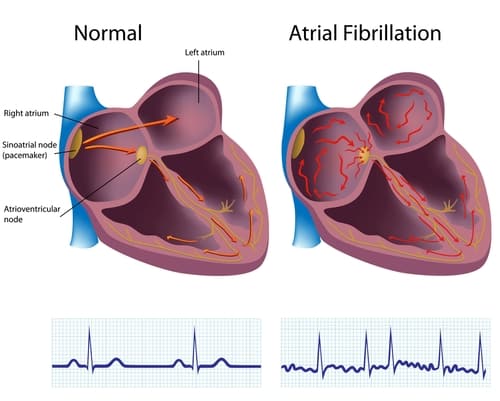Atrial Fibrillation 
Atrial fibrillation, often called AFib or AF, is the most common type of heart arrhythmia. An arrhythmia is when the heart beats too slowly, too fast, or in an irregular way. When a person has AFib, the normal beating in the upper chambers of the heart (the two atria) is irregular, and blood doesn’t flow as well as it should from the atria to the lower chambers of the heart (the two ventricles). AFib may occur in brief episodes, or it may be a permanent condition.
Atrial Fibrillation and What Causes It
- An estimated 2.7–6.1 million people in the United States have AFib. With the aging of the U.S. population, this number is expected to increase.
- Approximately 2% of people younger than age 65 have AFib, while about 9% of people aged 65 years or older have AFib.
- African Americans are less likely than those of European descent to have AFib.
- Because AFib cases increase with age and women generally live longer than men, more women than men experience AFib.
Atrial Fibrillation Symptoms
Some people who have AFib don’t know they have it and don’t have any symptoms. Others may experience one or more of the following symptoms:
- Irregular heartbeat
- Heart palpitations (rapid, fluttering, or pounding)
- Lightheadedness
- Extreme fatigue
- Shortness of breath
- Chest pain
AFib Risk Factors
The risk for AFib increases with age. High blood pressure, which also increases in risk with advancing age, accounts for 14% to 22% of AFib cases.2
Risk factors for AFib include2:
- Advancing age
- High blood pressure
- Obesity
- European ancestry
- Diabetes
- Heart failure
- Ischemic heart disease
- Hyperthyroidism
- Chronic kidney disease
- Heavy alcohol use
- Enlargement of the chambers on the left side of the heart
AFib increases a person’s risk for stroke by four to five times compared with stroke risk for people who do not have AFib. Strokes caused by complications from AFib tend to be more severe than strokes with other underlying causes. AFib causes 15%–20% of ischemic strokes, which occur when blood flow to the brain is blocked by a clot or by fatty deposits called plaque in the blood vessel lining.2
AFib Costs and Consequences
More than 750,000 hospitalizations occur each year because of AFib. The condition contributes to an estimated 130,000 deaths each year. The death rate from AFib as the primary or a contributing cause of death has been rising for more than two decades.3,4
AFib costs the United States about $6 billion each year. Medical costs for people who have AFib are about $8,705 higher per year than for people who do not have AFib.1,2
AFib Treatment
Treatment for AFib can include:
-
- Medications to control the heart’s rhythm and rate.
- Blood-thinning medication to prevent blood clots from forming and reduce stroke risk.
- Surgery.
- Medication and healthy lifestyle changes to manage AFib risk factors.
- Magnesium Cardiovascular Research Magnesium Taurate
Symptoms Of Atrial Fibrillation
The symptoms of AF are different for each person. Some people with AF can tell as soon as AF begins. Others don’t have any symptoms. They do not even know they have AF.
This is because the symptoms depend on the rate of the heartbeat while in AF, the cause of AF (other heart problems, diseases, etc.), and on how much AF affects the pumping of the heart. The symptoms of AF include:
- Having a pulse that is faster than normal or one that changes between fast and slow
- Being short of breath
- Experiencing heart palpitations (feeling like your heart is racing, pounding, or fluttering)
- Having trouble with everyday exercises or activities
- Experiencing pain, pressure, tightness, or discomfort in your chest
- Feeling dizzy or lightheaded
- Fainting
- Having to use the bathroom more often
(Resourced from American Heart Rhythm Association)
Conclusion
Atrial fibrillation is a very serious heart disease. Atrial fib is one of the leading causes of stroke. However, atrial fibrillation can be controlled and strokes can be prevented with proper treatment.


1 thought on “Atrial Fibrillation and What Causes It?”